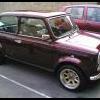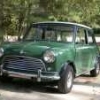
Mechanical Or Electrical Water Temperature Gauge?
#1

Posted 20 March 2008 - 07:43 PM
I am looking to put smiths gauges in my car, before it was Nippon Seiki ones. I wanted to know if its a Mechanical or Electrical Water Temperature Gauge i would need??
thanks if anyone can help as i plan to buy one within the next couple of days
#2

Posted 20 March 2008 - 07:55 PM
#3

Posted 20 March 2008 - 07:59 PM
Hi, i've done a search but haven't seem to find the answer to my query.......
I am looking to put smiths gauges in my car, before it was Nippon Seiki ones. I wanted to know if its a Mechanical or Electrical Water Temperature Gauge i would need??
thanks if anyone can help as i plan to buy one within the next couple of days
I hate to disagree with RH but as standard the mini is fitted with an electrical water guage, this works off a sender fitted to the cylinder head.
A mechanical one works by capillery(bad spellink!!).
Seamus
#4

Posted 20 March 2008 - 08:19 PM
#5

Posted 20 March 2008 - 08:30 PM
#6

Posted 20 March 2008 - 08:52 PM
Lets clarify what you mean.
Do you mean the difference between a DIGITAL guage or a ANALOGUE one?
Or a Mechanically signalled guage or an electrically signalled one?
From your first post I assume you mean the way the guage is controlled?
A mechanical guage is a PITA!!
The feed tube to guage needs to be run without kinks and is prone to failure, I have had a sucession of MGs which were fitted with mechanical guages and all worked intermittantly!!
I would not go for a mechanical guage.
Seamus
#7

Posted 20 March 2008 - 09:15 PM
I don't want to turn this into an argument!!!
Lets clarify what you mean.
Do you mean the difference between a DIGITAL guage or a ANALOGUE one?
Or a Mechanically signalled guage or an electrically signalled one?
From your first post I assume you mean the way the guage is controlled?
A mechanical guage is a PITA!!
The feed tube to guage needs to be run without kinks and is prone to failure, I have had a sucession of MGs which were fitted with mechanical guages and all worked intermittantly!!
I would not go for a mechanical guage.
Seamus
Ok i'll buy the electrically signalled smiths classic gauge, cheers Seamus
#8

Posted 20 March 2008 - 09:38 PM
The mechanical gauges typically fall into two types, traditional with about 270 degrees of needle sweep, or 180 degrees of sweep as part of a "dual gauge" combined with an oil pressure gauge. I believe Smiths did make a few of the 90 degree sweep gauges but if you're after accuracy... they are not the ones for you. By virtue of having 270 degrees of sweep, the mechanical gauge can usually exceed the accuracy of the common Smiths electrical gauge. However, exactly HOW accurate do you really think you need to be. Unfortunately, the dual gauges are very expensive while the 270 degree gauges are modestly priced (inexpensive if you opt for something other than Smiths). But the capillary tube is VERY fragile. It's very common for people to have difficulty removing the expansion bulb from the cylinder head and break the tube rendering the gauge useless. A last thing to mention about the mechanical gauges is that they do respond a little faster than the electrical gauges (not by much) and they will show you the engine temperature with the key removed from the ignition switch.
The Smiths electrical gauges are very easy to install. Just remember that unlike most aftermarket gauges, they expect you to supply them with regulated 10V, NOT full charging system voltage. There is also the issue of getting a sending unit to match your gauge. There are at least three possible combinations of Smiths gauges and sending units. I have yet to find someone who can tell me definitively which sender goes with which gauge. Then there is the issue of the standard resolution of the gauge. As stated above, the common Smiths temperature gauge will have about 90 degrees of needle swing. That doesn't leave a lot of room between graduations on the scale. BUT, as I mentioned above, exactly how accurate do you think you need this to be? MOST of the Smiths electrical gauges are calibrated only with "C-N-H" though the classic line does include scale graduations at about every 20 (temperature) degrees.
There's also the issue of adapters as mentioned above. The mechanical gauges SOMETIMES require an adapter to prevent the expansion bulb from bottoming out in the water jacket of the cylinder head. The adapter is a standard product offering and should be available at MiniSpares.
So, you can install either type of gauge. You're weighing a potentially more accurate gauge that's harder to install and may require an adapter against a gauge that really requires you to buy a new sending unit at the same time (to insure a match) and you may have to get creative supplying it with 10V. By far, installing the electrical gauge is easier for me, however, the mechanical gauges can be more accurate (with 270 degrees of needle sweep) when you really need a more accurate gauge.
#9

Posted 20 March 2008 - 10:38 PM
ive used both types too, and the electrical sender units are available for around £5(ish) and screw straight in to the cylinder head, same as the capilary unit, where, if no gauge was origionally fitted there will be a blanking plug. i might be able to find an electrical sender bit if you want it you can have it?! pm me if ur interested.So the electrical one is standard but the mechanical one is more accurate? Whichever one i choose do i have to buy additional fittings to make them work?
tara
James
1 user(s) are reading this topic
0 members, 1 guests, 0 anonymous users
















